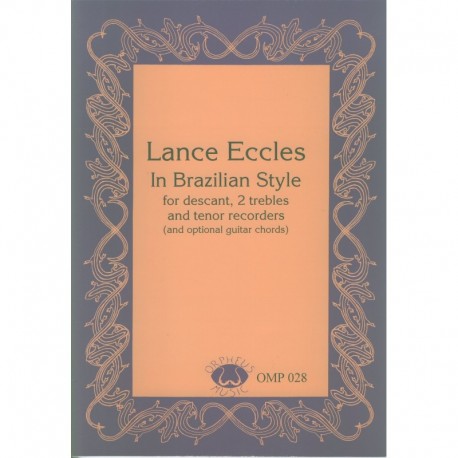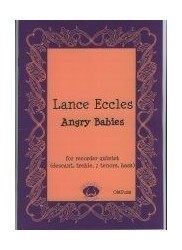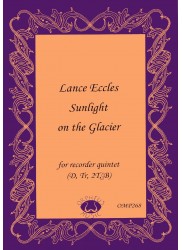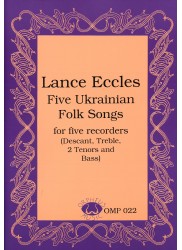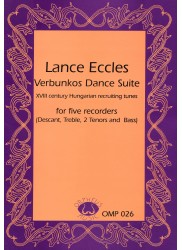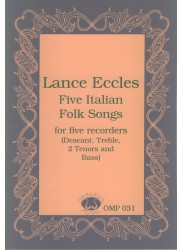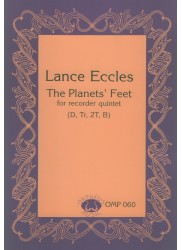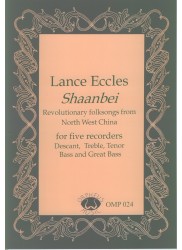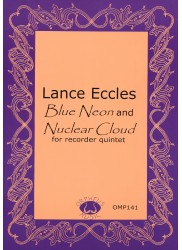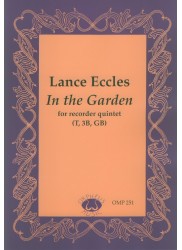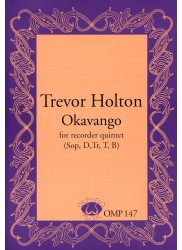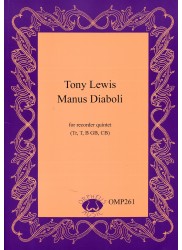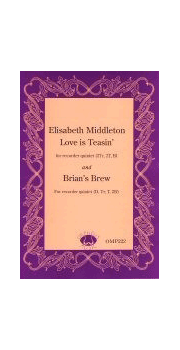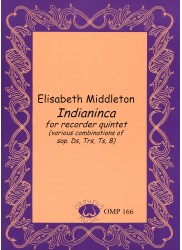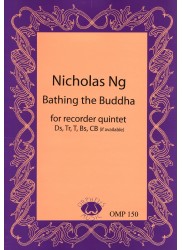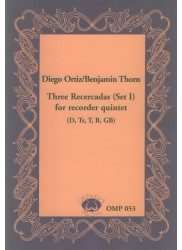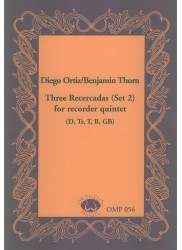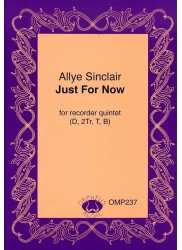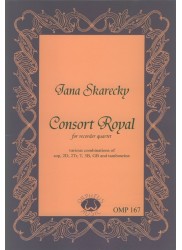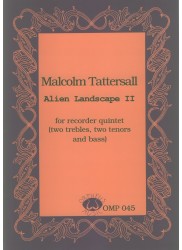No products
Prices are tax included
In Brazilian Style
OMP028.pdf
PLEASE NOTE - DOWNLOADABLE PDF VERSION
Composer: Eccles - Lance
Instrumentation: Descant - 2 Trebles - Tenor - Bass + optional Guitar chords
Period/genre: Australian Contemporary
Grade: Difficult
More info
*Contemporary Pieces.* Four attractive rhythmic pieces written in Brazilian idioms.
1. Little Horses
2. Birds in the Forest
3. Capybara Heaven
4. Ladies of Paradise
Please note that due to the automated delivery of virtual products including pdf downloads, PayPal payment is required at the checkout - we are unable to accept the cheque payment method for these items.
_Score 12 pp. Parts 4 pp. Downloadable PDF file - 1230 Kb._
OMP028 Lance Eccles In Brazilian Style
Many composers have used the bossa nova rhythms and ideas as inspiration for their new works. Lance Eccles, a prolific Australian recorder composer and performer, has contributed In Brazilian Style, consisting of four pieces of various moods. Before attempting any of them, an ensemble would be wise to listen to some of the great hits of this genre, such as "The Girl from Ipanema", "Baia", and "A Day in the Life of a Fool", especially paying attention to the underlying rhythms and the length or shortness of the different notes. Bossa nova involves many a phrase of sliding over or across the main beats, like short glides when ice skating instead of regular pumping the legs for speed. This is where a group should be relying on the percussion, or as here, on the guitar's chords and pulsations. Anyone who simply tries to play this music straight through with a steady ONE-two-THREE-four type of beat is going to be disappointed. The whole ensemble must listen to each other more and sense where it is they are going.
Of the four pieces, I would start with the third, "Capybara Heaven", because of its andante nature and melody. It very well "describes" the bouncing gait of the large South American rodent of the title. Here most of the rhythm comes from the soprano recorder while the rest of the group provides a steady pulse underneath. Then, having developed a feel for the style, I would have everyone tackle what I believe is the strongest of the set, number four, "Ladies of Paradise". It reminds me of the wonderful old standard, "Tico-Tico". The soprano leaps into the lead again, as in "Capybara Heaven", but this time the first alto breaks in, picking up some of the melody lines and creating some interesting short "conversations". It is a fresh and exuberant whole, well worth the playing.
Looking at the first two pieces of the set, I cannot be as enthusiastic. The first, "Little Horses", struck me as too repetitive of its main ideas for my taste. I don't think I would program it for an audience. The second, "Birds in the Forest", seemed like a beginning sketch to me, one in which I never felt I knew where it was going - or particularly why it should want to!
I believe advanced groups and professional ensembles should add this collection of Eccles' works to their repertoires for the sake of the last two pieces. They do need very-good-to-crackerjack players who are not afraid to try new styles (the meaning of "bossa nova"). I would even consider multiplying players on each line, developing it into a recorder-orchestra setting. Any audience, I think, will love them.
Richard Carbone, American Recorder, November 2002
30 other products in the same category:
Reference: OMP188
Brand: Orpheus Music
Angry Babies
Composer: Eccles - Lance Instrumentation: Descant - Treble - 2 Tenors - Bass...
In StockReference: OMP188.pdf
Brand: Orpheus Music
Angry Babies
PLEASE NOTE - DOWNLOADABLE PDF VERSION Composer: Eccles - Lance...
$25.00 -20%In StockReference: OMP268
Brand: Orpheus Music
Sunlight on the Glacier
Composer: Eccles - Lance Instrumentation: Descant - Treble - 2 Tenors - Bass...
In StockReference: OMP268.pdf
Brand: Orpheus Music
Sunlight on the Glacier
PLEASE NOTE - DOWNLOADABLE PDF VERSION Composer: Eccles - Lance...
$22.00 -20%In StockReference: OMP022.pdf
Brand: Orpheus Music
Five Ukranian Folk Songs
PLEASE NOTE - DOWNLOADABLE PDF VERSION Composer: Eccles - Lance...
$23.50 -20%In StockReference: OMP026.pdf
Brand: Orpheus Music
Verbunkos Dance Suite
PLEASE NOTE - DOWNLOADABLE PDF VERSION Composer: Eccles - Lance...
$23.50 -20%In StockReference: OMP031.pdf
Brand: Orpheus Music
Five Italian Folk Songs
*PLEASE NOTE > DOWNLOADABLE-ONLY PDF VERSION Composer: Eccles - Lance...
$23.50 -20%In StockReference: OMP060
Brand: Orpheus Music
The Planet's Feet
Composer: Eccles - Lance Instrumentation: Descant - Treble - 2 Tenors - Bass...
In StockReference: OMP024
Brand: Orpheus Music
Shaanbei Four Folk Songs North-West China
Composer: Eccles - Lance Instrumentation: Descant - Treble - Tenor - Bass -...
In StockReference: OMP024.pdf
Brand: Orpheus Music
Shaanbei Four Folk Songs North-West China
PLEASE NOTE - DOWNLOADABLE PDF VERSION Composer: Eccles - Lance...
$23.50 -20%In StockReference: OMP141.pdf
Brand: Orpheus Music
Blue Neon and Nuclear Cloud
PLEASE NOTE - DOWNLOADABLE PDF VERSION ONLY Composer: Eccles - Lance...
$19.00 -20%In StockReference: OMP141
Brand: Orpheus Music
Blue Neon and Nuclear Cloud
Composer: Eccles - Lance Instrumentation: Descant - 2 Trebles - Tenor - Bass...
In StockReference: OMP251
Brand: Orpheus Music
In the Garden
Composer: Eccles - Lance Instrumentation: Tenor - 3 Basses - Greatbass...
In StockReference: OMP251.pdf
Brand: Orpheus Music
In the Garden
PLEASE NOTE - DOWNLOADABLE PDF VERSION Composer: Eccles - Lance...
$19.00 -20%In StockReference: OMP147.pdf
Brand: Orpheus Music
Okavango
PLEASE NOTE - DOWNLOADABLE PDF VERSION ONLY. Composer: Holton - Trevor...
$22.00 -20%In StockReference: OMP147
Brand: Orpheus Music
Okavango
Composer: Holton - Trevor Instrumentation: Sopranino - Descant - Treble -...
In StockReference: OMP261
Brand: Orpheus Music
Manus Diaboli
Composer: Lewis - Tony Instrumentation: Treble - Tenor - Bass - Greatbass -...
In StockReference: OMP222
Brand: Orpheus Music
Love is Teasin' & Brian's Brew
Composer: Middleton - Elisabeth Instrumentation: Descant - Treble - Tenor -...
In StockReference: OMP222.pdf
Brand: Orpheus Music
Love is Teasin' & Brian's Brew
PLEASE NOTE - DOWNLOADABLE PDF VERSION Composer: Middleton - Elisabeth...
$19.00 -20%In StockReference: OMP166*
Brand: Orpheus Music
Indianinca
Composer: Middleton - Elisabeth Instrumentation: Sopranino - Descant -...
In StockReference: OMP166.pdf
Brand: Orpheus Music
Indianinca
PLEASE NOTE - DOWNLOADABLE PDF VERSION Composer: Middleton - Elisabeth...
$19.00 -20%In StockReference: OMP150
Brand: Orpheus Music
Bathing the Buddha
Composer: Ng - Nicholas Instrumentation: Tenor - Bass + optional Contrabass...
In StockReference: OMP053
Brand: Orpheus Music
Three Recercadas Set 1
Composer: Ortiz - Diego Arranger: Benjamin Thorn Instrumentation: Descant -...
In StockReference: OMP053.pdf
Brand: Orpheus Music
Three Recercadas Set 1
PLEASE NOTE - DOWNLOADABLE PDF VERSION Composer: Ortiz - Diego Arranger:...
$25.00 -20%In StockReference: OMP056*
Brand: Orpheus Music
Three Recercadas Set 2
Composer: Ortiz - Diego Arranger: Benjamin Thorn Instrumentation: Descant -...
In StockReference: OMP056.pdf
Brand: Orpheus Music
Three Recercadas Set 2
*PLEASE NOTE > DOWNLOADABLE-ONLY PDF VERSION Composer: Ortiz - Diego...
$22.00 -20%In StockReference: OMP237
Brand: Orpheus Music
Just For Now
Composer: Sinclair - Allye Instrumentation: Descant - 2 Trebles - Tenor -...
In StockReference: OMP237.pdf
Brand: Orpheus Music
Just For Now
PLEASE NOTE - DOWNLOADABLE PDF VERSION Composer: Sinclair - Allye...
$22.00 -20%In StockReference: OMP167.pdf
Brand: Orpheus Music
Consort Royal
PLEASE NOTE - DOWNLOADABLE PDF VERSION Composer: Skarecky -...
$31.00 -20%In StockReference: OMP045
Brand: Orpheus Music
Alien Landscape II
Composer: Tattersall - Malcolm Instrumentation: 2 Trebles - 2 Tenors - Bass...
In Stock

